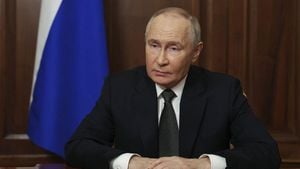Recent developments surrounding Israeli Prime Minister Benjamin Netanyahu have ignited strong reactions both domestically and internationally following the issuance of arrest warrants by the International Criminal Court (ICC). The warrants, issued on November 21, 2024, detail accusations of war crimes against Netanyahu, former Defense Minister Yoav Gallant, and Hamas military chief Mohammed Deif. This unprecedented situation has divided global opinions and raised questions about international law and accountability.
The ICC's decision came against the backdrop of the Israel-Hamas conflict, which worsened dramatically after Hamas's surprise assault on Israel on October 7, 2023. That attack resulted in approximately 1,200 Israeli deaths and the abduction of around 250 individuals taken hostage to Gaza. The subsequent military response by Israel has reportedly led to extensive casualties, with estimates indicating over 44,000 Palestinians killed by Israeli strikes, as reported by health authorities in Gaza.
ICC judges found “reasonable grounds” to believe both Netanyahu and Gallant are criminally responsible for using starvation as warfare, among other serious war crimes. The accusations against Deif include heinous acts such as murder and torture, which purportedly stemmed from orchestrated attacks against Israeli civilians.
While the warrants have been met with outrage from many Israeli citizens, there are notable divisions even among global superpowers. U.S. President Joe Biden described the ICC’s actions as “outrageous,” expressing unwavering support for Israel amid accusations he deemed unfounded. According to Biden, there is “no equivalence - none - between Israel and Hamas,” framing his administration’s stance as one of strong alignment with Israeli interests.
On the other hand, numerous European countries have shown willingness to cooperate with the ICC, stating they respect the court’s decisions. Countries like France, Italy, Belgium, and Ireland have indicated they would comply with the arrest warrants should Netanyahu or Gallant enter their territories. EU foreign policy chief Josep Borrell emphasized the expectation for member states to respect and implement the decision, fundamentally portraying the ICC as not merely political but also as an entity performing necessary legal obligations.
Responses from within Israel reveal significant public support for Netanyahu, who has branded the ICC's decisions as "antisemitic" and likened the proceedings to the Dreyfus Affair, a notorious historical episode symbolizing deep-seated anti-Jewish sentiment. Netanyahu stated, "The antisemitic decision of the international court... will end the same way" as the Dreyfus case. He contended Israel's humanitarian efforts, citing the provision of food and efforts to warn Gaza civilians before attacks, claiming these were proof against the ICC's accusations.
Former Israeli Prime Minister Ehud Olmert, though criticizing Netanyahu’s handling of the conflict, also denounced the ICC's warrants, arguing they were unfounded. He expressed concern over equipping perceived terrorist organizations alongside legal representatives of democratic states.
Meanwhile, Hamas welcomed the ICC's actions, viewing the warrants as historic reformative steps toward addressing longstanding injustices. A spokesperson for Hamas stated the warrants formed part of correcting historical wrongs against their people.
The legal and diplomatic ramifications are significant, especially considering Israel and the U.S. are not parties to the Rome Statute, which established the ICC. This means they do not recognize the court's authority. The president of the ICC has urged international cooperation for enforcement of such warrants, yet enforcement heavily relies on the willingness of member states.
The UK government indicated it would obey legal commitments stemming from the ICC's decision without explicitly stating if they would arrest Netanyahu, which leaves room for diplomatic maneuvering. The spokesperson for UK Prime Minister Keir Starmer affirmed this legal path would be carefully followed.
Contrastingly, nations like Hungary have openly rejected the ICC’s ruling, with Prime Minister Viktor Orban inviting Netanyahu to Hungary with reassurances of immunity from arrest. The Czech Republic echoed such sentiments, with Prime Minister Petr Fiala labeling the court's actions as unfortunate, implying it undermined the legitimacy of democratic states.
International law specialists argue this constitutes both a pivotal and potentially transformative moment for the ICC. Johann Soufi, legal expert and former spokesperson for the UN's Palestine refugee agency noted, "By issuing these warrants, the ICC has responded to the hopes of victims and those aspiring for international justice."
Critics have long accused the ICC of bias, observing its predominance of African subjects since its inception, igniting both dismay and support among various countries, especially from the Global South. The ICC's credibility relies significantly on the adherence of member states to its statutes. Discrepancies, such as nations' failure to act on warrants, like the example from Mongolia concerning Russian President Putin, demonstrate the fragility of international legal enforcement.
Calls for firm action from countries supportive of Palestine have intensified, with South Africa throwing its support behind the ICC's decision. Amidst these dynamics, Pope Francis has also emerged as a vocal critic of Israel. His comments calling for accountability and examination of Israel's actions could influence perceptions significantly.
Although the likelihood of apprehending high-ranking officials like Netanyahu or Gallant remains remote, particularly with their avoidance of ICC member territory, the legal outcome has escalated the complexity of international relations surrounding the Israeli-Palestinian conflict. The next steps from both the ICC and politically aligned governments indicate a larger struggle for justice, recognition, and adherence to international law.
With Netanyahu's world effectively narrowed due to potential arrest, the court's moves have compelled global leaders to engage with the intricacies of morality, legality, and political allegiance as this chapter of Israeli governance and international law evolves. The beautifully complicated choreography of diplomacy continues as nations weigh the action or impotence surrounding the ICC warrants, likely shaping the future discourse of international humanitarian rights.



